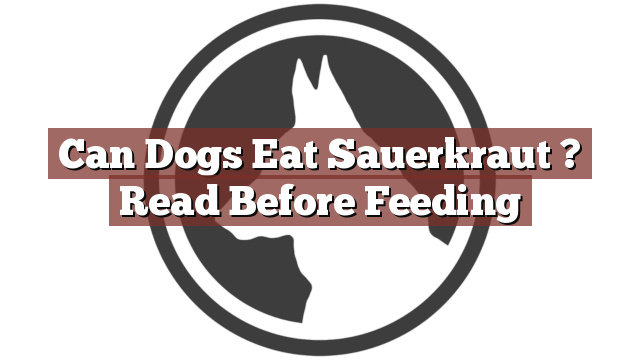Understanding Your Dog’s Dietary Needs
As pet owners, it is our responsibility to ensure that our dogs receive a well-balanced diet to maintain their health and well-being. Understanding our dog’s dietary needs is crucial in making informed decisions about their food. While some human foods are safe for dogs to consume, others can be harmful or even toxic. It is essential to be aware of what foods are suitable for our furry friends and what should be avoided.
Can Dogs Eat Sauerkraut? Read Before Feeding
Can dogs eat sauerkraut? This is a common question among dog owners who may be curious about sharing this tangy, fermented cabbage dish with their pets. The answer is yes, dogs can eat sauerkraut in moderation. Sauerkraut itself is not toxic to dogs and can be a healthy addition to their diet if served appropriately. However, it is crucial to note that not all dogs will tolerate sauerkraut well, and some may experience digestive upset or other adverse reactions.
Pros and Cons of Feeding Sauerkraut to Your Dog
While sauerkraut can offer some health benefits to dogs, it is important to weigh the pros and cons before incorporating it into their diet. One of the main advantages of sauerkraut is its probiotic properties. The fermentation process produces beneficial bacteria that can aid in digestion and promote a healthy gut. Additionally, sauerkraut is low in calories and can be a good source of vitamins C and K for dogs.
However, it is important to consider the cons as well. Sauerkraut is often high in sodium, which can be problematic for dogs with certain health conditions such as heart disease or kidney problems. It is crucial to choose low-sodium or sodium-free sauerkraut options when feeding it to your dog. Furthermore, some dogs may have sensitivities or allergies to cabbage or other ingredients in sauerkraut, so it is essential to introduce it gradually and observe any adverse reactions.
Conclusion: Be Mindful When Feeding Sauerkraut to Dogs
In conclusion, sauerkraut can be a safe and healthy addition to your dog’s diet when fed in moderation and under the right circumstances. However, it is important to consult with your veterinarian before introducing sauerkraut or any new food into your dog’s diet. They can provide guidance specific to your dog’s needs and help determine if sauerkraut is a suitable choice. Remember to choose low-sodium options and monitor your dog for any negative reactions. By being mindful and informed, you can make the best decisions for your furry friend’s dietary health.
Thank you for taking the time to read through our exploration of [page_title]. As every dog lover knows, our furry friends have unique dietary needs and responses, often varying from one canine to another. This is why it's paramount to approach any changes in their diet with caution and knowledge.
Before introducing any new treats or making alterations to your dog's diet based on our insights, it's crucial to consult with a veterinarian about [page_title]. Their expertise ensures that the choices you make are well-suited to your particular pet's health and well-being.
Even seemingly harmless foods can sometimes lead to allergic reactions or digestive issues, which is why monitoring your dog after introducing any new food item is essential.
The content provided here on [page_title] is crafted with care, thorough research, and a genuine love for dogs. Nevertheless, it serves as a general guideline and should not be considered a substitute for professional veterinary advice.
Always prioritize the expert insights of your veterinarian, and remember that the health and happiness of your furry companion come first.
May your journey with your pet continue to be filled with joy, love, and safe culinary adventures. Happy reading, and even happier snacking for your canine friend!

